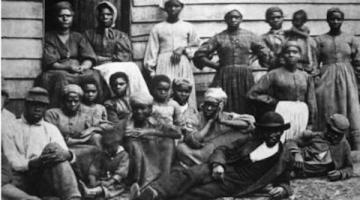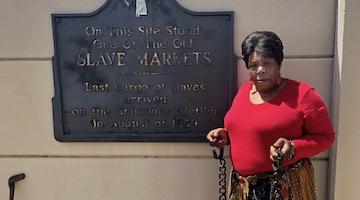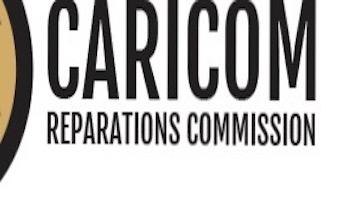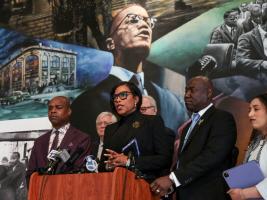Field Order 15 issued by General William T. Sherman in January 1865 set aside land for former enslaved people along the South Carolina and Georgia coasts. The order was rescinded by President Andrew Johnson.
International law requires that reparations be made for human rights violations. African Americans certainly fall into the category of those entitled to just compensation, restitution, and rehabilitation, but the question of what reparations should be is debated. The end result should be transformative, and not just liberal reformism in a system that would disadvantage Black people even if they were paid.
This article was originally published on the author's Patreon.
Congratulations Fam,
I hear that you’ve finally secured the bag, otherwise known as reparations. A cool $800,000 to be paid in eight annual installments, the first $100,000 of which arrived in your bank account today. Well, maybe not quite $100k, but about $75,000 after taxes. Still some nice coin.
So, how should we get the party started? You say you want to finally buy a house for you and your family? Seventy-five grand is not gonna get you that deluxe apartment on the upper East side, but it’s a nice downpayment on a three-bedroom condo in Teaneck or Tallahassee. All you have to do is pop into the bank and sign on the dotted line . . . but wait one cotton pickin’ minute; is that a subprime mortgage?
Perhaps America’s worst- kept secret is that usurious, adjustable mortgages were not designed to help African Americans who don’t have money but to exploit those who do. Consider this: at the apex of the last housing bubble in 2006, boom, black and Latino households earning more than $200,000 a year were more likely on average to be given a subprime loan than a white family making less than $30,000 a year. In fact, African American borrowers who were approved for a home loan were 2.4 times more likely to receive a subprime loan than white applicants and worse still is that the gap did not narrow as borrowers’ incomes rose, but rather expanded.
"Certainly we can’t rule out personal bias on behalf of lenders," Jacob Faber, a NYU associate sociology professor told Bloomberg News. But “(t)here’s a larger part of the story that the financial institutions responsible saw these profitable communities and targeted them specifically because they weren’t risky."
The same discriminatory pattern holds true for auto loans. One study found that borrowers of color paid $2,662 dollars more over the life of their auto loan than did whites with worse credit scores and a 1991 Yale university study concluded that the markups for African American women were three times more than what car dealers charged whte men. With $75K in your bank account, however, you can pay cash for that whip you always wanted and avoid the financing grift altogether.
But have you noticed the jump in car prices since Congress approved the reparations payouts? The sticker on that champagne Range you had your eye on has increased from $50,000 to $65,000, the pecan Jag from $60,000 to $80,000 and the big-body Benz? Fuhgettaboutit!
In fact, the price of everything has spiked dramatically in the months since reparations became the law of the land: gasoline, utilities, food, airfare, health insurance, and college tuition, all of which have drastically devalued the dollar’s buying power.
Who do you think gets blamed for that?
Let me be clear: other than the genocided Native tribes of North America, no one on God’s green earth is as deserving of reparations as the descendants of chattel slaves.
In the context of racial capitalism and post-industrialism, however, a cash transfer is tantamount to plying a busload of tourists with chips to play at an assortment of rigged Vegas slot machines. With the fix already in, a gambler or two might hit for a few dollars here and there, but most of that loot goes right back to the house.
To follow that metaphor to its logical conclusion, it would be inexact to say that black folks don’t need no stinkin’ chips, but what we need most is our own casino.
Proponents of reparations in the form of a big payday argue that is the best way to close the racial wealth gap. Speaking to National Public Radio about his book, From Here to Equality: Reparations for Black Americans in the 21st Century, Duke University economist William Darity Jr. said that while reparations could be used to support educational and entrepreneurial efforts, "the preponderance" of funds must be paid to individual recipients. "And they must go in such a way that we in fact eliminate the racial wealth gap," he said.
Darity is by all accounts well-meaning but that dog won’t hunt, if I may put it so bluntly. When Abraham Lincoln signed the Emancipation Proclamation on January 1, 1863, blacks owned one-half of one percent of all financial assets in the country. In the 159 years since that figure has barely budged and the consensus among today’s economists is that 42 million African Americans – representing roughly 13 percent of the total population in the U.S.– own about 1.5 percent of the nation’s wealth.
The persistence of such a yawning racial wealth gap is attributable to one thing and one thing only which is a system of racial capitalism that reduces black workers to a super-exploited subset of the working class. Absent any working capital, (or a functional democracy) blacks neither own nor control anything of material value.,
Consequently, our commercial choices are decided for us by the owners of capital, our bosses, landlords, and creditors, the vast majority of whom are white, and see African Americans as a nationwide network of ATMs from whom they are entitled to make regular withdrawals.
Hence, reparations in the form of individual cash disbursements would, for all intents and purposes, be a kind of money laundering scheme or elaborate pass-through, in which the U.S. Treasury fronts black households the money to pay their bills, similar to the International Monetary Fund’s 2013 bailout of Greece, which enabled the country to pay its debts to the IMF and other lenders, but did nothing to arrest Greeks’ financial woes.
Similarly, African Americans can only begin to close the racial wealth gap if we contextualize our subjugation as part of the broader class struggle, see ourselves as producers rather than mere consumers, and reimagine reparations as not just a payday but as a Marshall plan to redevelop a post-industrial U.S. economy that shipped nearly its entire manufacturing sector abroad over the past 45 years.
In this vein, the objective of a viable reparations program should not be a shopping spree, but the transformation of black working-class communities – Chicago’s South side, north Philadelphia, southeast Washington D.C., New Orleans’ 9th Ward, Houston’s 5th, swaths of west Oakland, all of Detroit – into a network of empowerment zones that are the final destination of repatriated, or innovative new industries.
The centerpiece of these economic development corridors would be worker-owned and managed enterprises, land and housing trusts, and the piece de resistance: the resurrection of the Freedman’s Bank as a nonprofit financial institution that offers borrowers of all races mortgages, college and car loans at low-interest rates.
This would accomplish a number of ambitious goals. First, it would help repair the broken supply chains that we all heard so much about during the Covid19 pandemic, and restock depleted store shelves and empty showrooms with infant formula, semiconductors and even automobiles.
Second, reparations could spearhead national efforts to address the climate crisis, with African American worker cooperatives reopening shuttered inner-city auto plants, steel mills or refineries to build and service energy-efficient windows and doors, solar panels, and wind turbines.
And thirdly, legislation focused on restructuring the economy and lowering consumer costs would lessen the inevitable white, racist backlash by recasting reparations as the solution to one of the country’s most vexing problems, particularly if the plan is combined with universal policies such as the wildly popular Medicare-4-All and a Basic Income Grant for all households earning less than, say, $65,000 annually, and it is financed entirely with tax levies on the wealthiest 1 percent and their luxury purchases.
How might this work in practice? Let’s look at Chicago, a city I know relatively well. For argument’s sake, say the city’s black empowerment zone cordoned off a swath of the mostly black Southside bordered by 31st Street in the Bronzeville neighborhood in the North, the lakefront to the east, the Dan Ryan Expressway to the West and the Chicago Skyway to the South. In addition to a federal income surtax on incomes of more than $500,000 annually, and a Robin Hood tariff on all Wall Street financial transactions, reparations in Chicago could be funded by a property tax levy on the city’s wealthiest neighborhoods, to include the Loop, and the Board of Trade, Lincoln Park, the Gold Coast and the University of Chicago.
Those tax revenues would be used to capitalize the local branch of the Freedman’s Bank, and purchase residential housing and commercial property in the designated district, all of which would be rolled into a community trust to be managed by a local council of elected representatives (who could not accept contributions from donors who live outside the empowerment zone).
Either through a proxy vote or referendum the community would decide whether the rents for a housing complex would be affordable or market rate, whether to convert a storefront into a daycare center or a grocery coop, whether to use an industrial site to can peaches or manufacture sneakers, or whether to repurpose a vacant lot as a park or a community garden.
There is absolutely nothing wrong with buying a flat-screen tv, but it’s even better if you or your neighbor also sell flat-screen televisions. Development economists refer to this trade model as “import substitution” and African independence movements used the strategy to great effect in their efforts to grow their postcolonial economies.
The strategy has the added benefit of heeding the advice of two great Chicagoans. The fundamental problem with the proposals by Darrity and others envisioning reparations primarily as a paycheck is that it is liberal, and reformist, and fails to grasp the root of the problem posed by racial capitalism. A problem created by the free-enterprise system is not likely to be addressed by the free-market, or as one of our nation’s most radical thinkers, Fred Hampton once said, black capitalism is insufficient to counter to white capitalism; only revolutionary socialism can correct course.
Less famous but equally profound in its own way is the architect Daniel Burnham’s exhortation:
“Make no little plans. They have no magic to stir men’s blood.”
A former foreign correspondent for the Washington Post, Jon Jeter is the author of Flat Broke in the Free Market: How Globalization Fleeced Working People and the co-author of A Day Late and a Dollar Short: Dark Days and Bright Nights in Obama's Postracial America. His work can be found on Patreon.



















